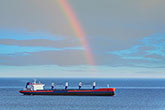Mineral exports from Indonesia
Published by Louise Mulhall,
Editorial Assistant
Dry Bulk,
According to Gard, the Indonesian regulations came into force on 6 May 2012 and required mines producing ores such as iron, nickel bauxite, silver, copper or tin to have in place plans to develop their own processing and purification plants by 2014. Mines which did not have these plans in place by 12 January 2014 would effectively be banned from exporting these unrefined minerals from Indonesia. In 2014, Indonesian authorities looked at relaxing the purity percentage for compliance, thus easing the restrictions on the amount of ore that could be exported.
The Indonesian requirements were covered in our Gard Alert of 3 May 2012 and our update on the requirements, published in February 2014, addressed the Indonesian government’s initiative to ease the consequences of the ban on the mining industry.
Gard’s correspondents, SPICA Services (Indonesia) have provided some further clarification on the Indonesian government’s reputed easing of the export limitations on dry bulk minerals. A number of articles in various trade journals have suggested that Indonesia has eased its bauxite and nickel export restrictions. However our correspondents are of the view that this is not the case and summarise the current position as follows:
The latest Indonesian Ministerial Decrees state that:
- Nickel ore with a Nickel content of less than 1.7% must be absorbed by domestic smelters to supply them with at least 30% of their input capacity. The remaining available cargo may be exported with the usual approvals.
- Washed bauxite with a bauxite content of 42 per cent or greater may be exported.
- IUPK (Special Mining Business Permit) holders wishing to continue exports of mineral concentrates, nickel ore and bauxite must also pay export taxes in the form of smelter development. The finance minister will set the range of taxes.
- To obtain an export recommendation from the Energy and Mineral Resources Ministry, miners/exporters must fulfil eight requirements. Amongst these is the need to agree to build a smelter within five years. Please note that this is the same requirement as was included in the regulation which entered into force in 2012).
- Furthermore, the Government must receive confirmation every six months that the smelter development is underway, following which export approval will be provided.
In light of the above comments, there is little change evident at the moment and the situation will need to be monitored until there are clear evidence that the export of such minerals has resumed.
In the meantime and until such firm confirmation has been received, Members and clients should continue to check before any fixture is entered into or charterparty orders accepted, that the supplier of the cargo has the necessary export permits.
It should also be borne in mind that, if Indonesia resumes the export of these minerals in the near future, the risk or liquefaction is likely to increase given the amount of time that has elapsed since the ban was imposed and the length of time the cargo may have been in storage.
Source: Gard (http://www.gard.no/web/updates/content/22945570/mineral-exports-from-indonesia)
Read the article online at: https://www.drybulkmagazine.com/dry-bulk/14032017/mineral-exports-from-indonesia/
You might also like
BIMCO and IBIA collaborate on maritime challenges
IBIA and BIMCO have announced their collaboration on fuel and maritime challenges in order to facilitate shipping's decarbonisation.

